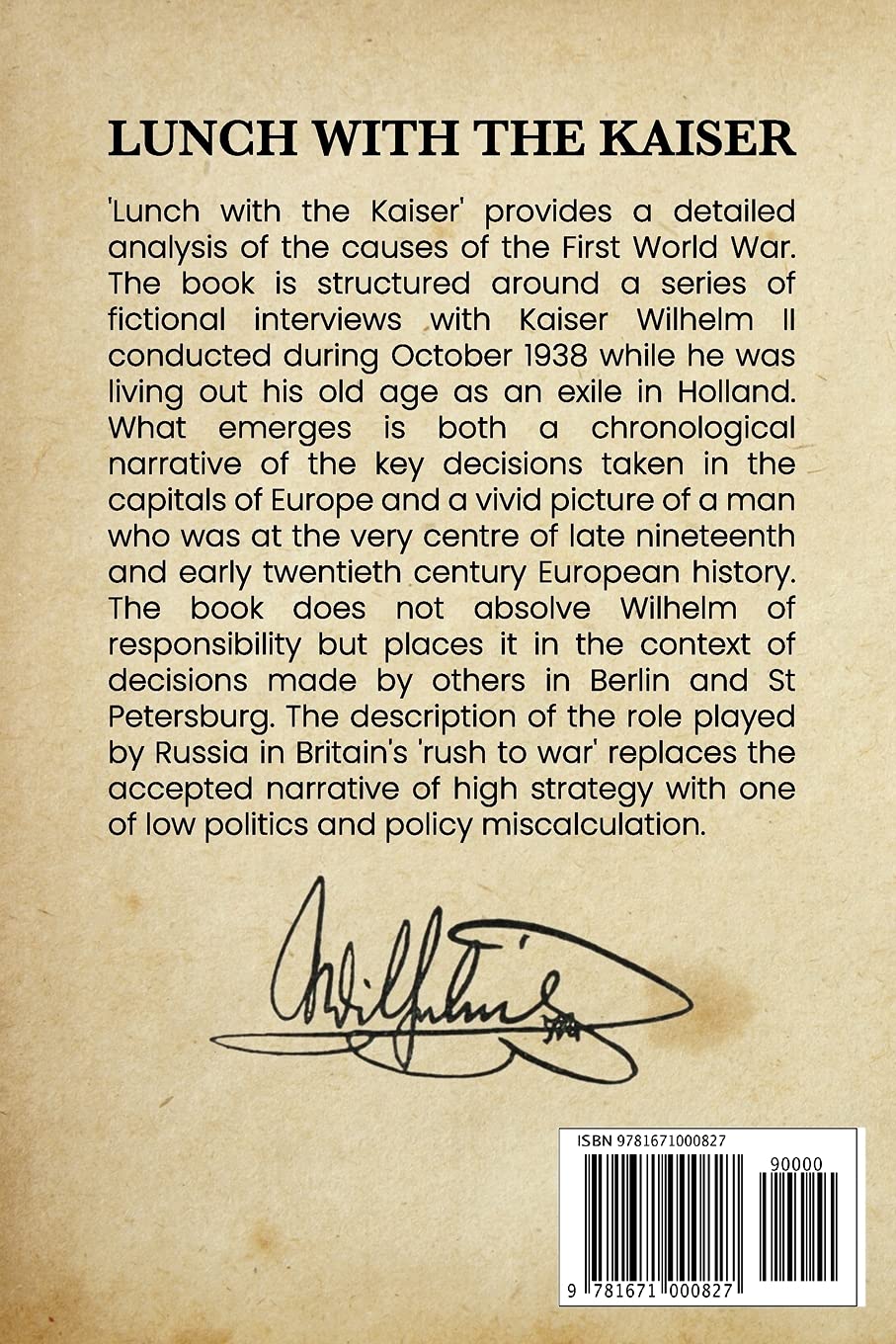


Independently Published Lunch with the Kaiser: Why Europe went to war in 1914
M**I
Excellent conversation between the Kaiser in exile and a reporter representing the victors
History is written by the victors. This book is deep in historical fact, well researched and yet presented as a story and conversation that allows for alternative viewpoints be made on how the 1st World War started and who shares the blame. I was taught the British viewpoint in my schooldays - in essence Britain entered the ware due to treaty obligations with Belgium. This can now be seen as untrue.A valuable book for lovers of history.
T**C
A different aspect of the origins of the Great War
A British journalist was sent to The Netherlands to interview Kaiser Wilhelm II in 1938 to possibly find clues so that the world might avoid a new war (unsuccessful). Without saying more, the book shows the folly of “alliances”, whereby one country is obligated to join the fight if another ally is attacked, even if the non involved country has little or no national interest. So this book is particularly relevant in March 2022. And it’s thought provoking. Obviously Kaiser Wilhelm provides a self-serving narrative. However, he begs the question: did Britain join this insane war to avoid a Russian take over of India in the event Britain left Russia to deal with Germany without British assistance.
A**R
High recommended read
Brilliant book!The structure of Lunch with the Kaiser helped me to understand the complex sequence of events leading up to the outbreak of war in 1914. Rather than having separate chapters on the decisions taken in Berlin, St Petersburg or London, the key decisions are presented in strict chronological order. This gives a sense of the pressure of events in Berlin and St Petersburg, particularly as it intensified in the final days before war.I found the exploration of the strategic and political issues surrounding Britain’s decision for war fascinating. I had always believed that British intervention was made in support of France and Belgium but the examination of the development of Foreign Office policy and the evidence from the cabinet war diaries quoted, paints a picture of the rush to war being driven by Britain’s vulnerability to Russian pressure in Persia and India – great insight into the politics behind the decision!The story that runs inside the book, the idea of a young reporter being sent to interview the Kaiser in his old age in exile in Holland, was an effective way of presenting complex historical details with vivid passages of dialogue and atmosphere. I think the story has a certain charm.The picture of Wilhelm II that emerges is not flattering, he certainly made mistakes, but in a final twist, in the last days before the outbreak of war, he appears as the only person in Berlin or St Petersburg working to achieve a negotiated settlement.A complex subject made accessible - would highly recommend!
D**S
Clear & intriguing narrative on a very complex situation leading to WW1
"Lunch with the Kaiser", was an intriguing and engaging read into the events leading up to the first world war. I really enjoyed the how the author revealed the story through a series of interviews by a young journalist which not only gave me an alternative ,more personal insight into the character of the Kaiser, but made it easier to see how alliances were formed, personal agendas interjected. And, as with most wars, self interest, belief, and territorial power struggles lead to deadly consequences.Finally, I also found the reference to Kennedy interesting, as it reminds us the importance of historically based books such as this, where we are reminded how we can avoid the atrocities of war...Congratulations!!
B**E
Vivid account of an extraordinary period of history
The lead up to the First World War was an extraordinary period of history - and this novel brings it vividly to life. It follows a young journalist, sent by his newspaper to interview the Kaiser, who had been in exile in Holland for twenty years. He had purchased a country house, known as Huis Doorn, and it was to be his home for the remainder of his life, surrounded by an eccentric mix of servants. The Kaiser is volatile, quixotic and guarded - but gradually he opens up more and more to Edward, revealing his version of the apocalyptic series of events, misjudgements and fate that led to the outbreak of war in 1914. A fascinating book.
M**N
Good book
This was an interesting interpretation of history. I like that the kaiser got a voice.
TrustPilot
1 周前
2 周前